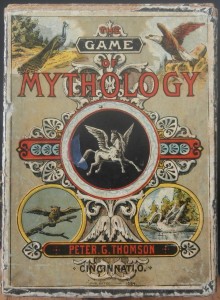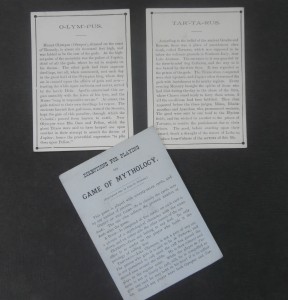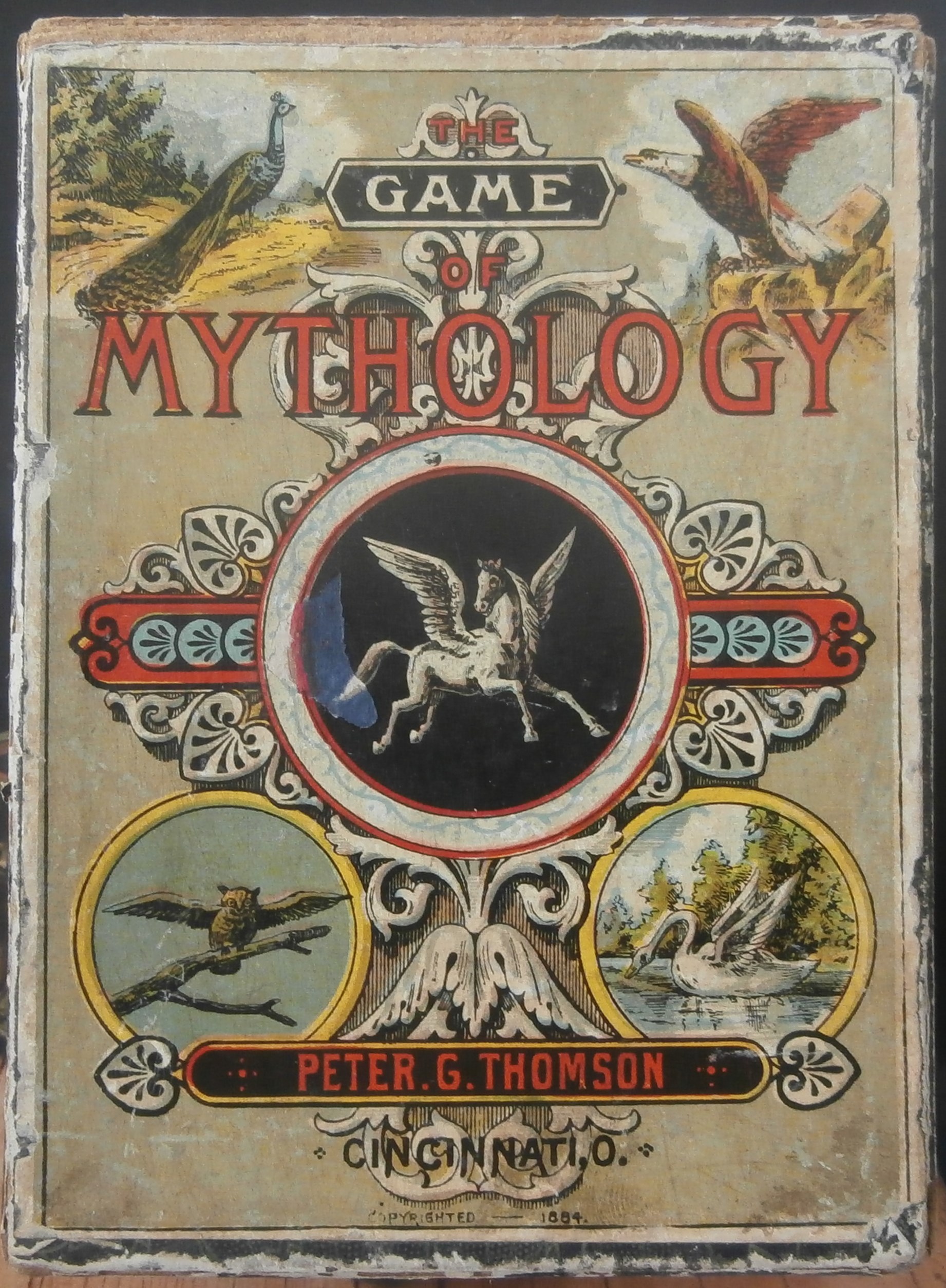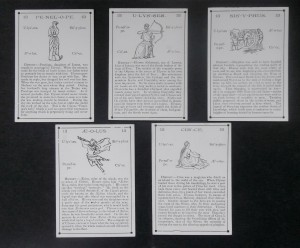 The 1884 game of Mythology, published by Peter G. Thomson of Cincinnati, includes a small booklet that relates how the game was created to help players “become familiar with the main characters of heathen mythology, in an easy and interesting way.” Mythology (the game) consists of seventy-seven unique cards. Seventy-five of which depict an image of a mythological character and contain a brief description of the character featured. The other two cards give an account of the places known as Olympus and Tartarus. Like said, playing the game certainly does offer an intriguing glimpse into the fascinating subject of Mythology.
The 1884 game of Mythology, published by Peter G. Thomson of Cincinnati, includes a small booklet that relates how the game was created to help players “become familiar with the main characters of heathen mythology, in an easy and interesting way.” Mythology (the game) consists of seventy-seven unique cards. Seventy-five of which depict an image of a mythological character and contain a brief description of the character featured. The other two cards give an account of the places known as Olympus and Tartarus. Like said, playing the game certainly does offer an intriguing glimpse into the fascinating subject of Mythology.
The antique game not only supplies short narratives on many ancient Greek and Roman gods, but within these accounts are origins for some of the various sayings used today. These help players understand their meanings and appreciate how they developed over time. For instance, one of the cards gives a brief history on Penelope. Within this story the origin to the Web of Penelope is related. Part of the card reads:
“During her husband’s long absence at the Trojan war, Penelope was besieged by many suitors. As it seemed probable that Ulysses would never return, she promised to make her choice as soon as a robe she was making should be finished. During the day she worked on the robe, but at night she undid the work of the day. This is the famous ‘Penelope’s Web’, which is used as a proverbial expression for anything which is perpetually doing and never done.”
The Gordian Knot, Pandora’s Box, and Niobe’s Tears are examples of other phrases the cards offer understandings for in the game.
The game also provides an explanation on how some early mythological tales were later used to express Christian ideals. The stories of the ancient gods and heroes were extremely popular in the past, and were believed to hold important concepts. Because of this, depictions of these are found used to represent Christian beliefs. A small pamphlet of the game includes, “thus, Orpheus, taming with his sweet music the wild beasts of the forest, is made to typify the power of divine grace to tame the passions of the human soul.” Discovered throughout the cards are other examples of how the pagan legends relate to Christian thought.
To play the game, all cards are dealt to players one by one. If an uneven number of cards is found to be dealt to players, the remaining odds are given to the player who holds the ‘Olympus’ card. This player is also the person who goes first in the game.
The object of the game is to collect as many ‘books’ as possible. Books are a set of five cards (example shown below). Each card displays an image of a mythological character with the name above. On the sides of this image are four other names which belong to the set. Players take turns asking other players for a card to complete a set found from his own hand of cards. If successful, a player goes again. If not, play passes to the next player. When a player completes a book, he places the set in front of him.
Upon the completion of a book, the player is instructed to mention anything he finds interesting from within the descriptions of any of the characters from his book he is placing down.
 There are two special cards in the deck that do not make up a book; Olympus and Tartarus. As stated above, the player with the Olympus card would receive the odd remaining cards when dealt, and be the player to go first. The person who holds the Tartarus card is directed to not be allowed to call for a card on the first round. However, he is required to give a card from his hand if called upon.
There are two special cards in the deck that do not make up a book; Olympus and Tartarus. As stated above, the player with the Olympus card would receive the odd remaining cards when dealt, and be the player to go first. The person who holds the Tartarus card is directed to not be allowed to call for a card on the first round. However, he is required to give a card from his hand if called upon.
The game ends when all books are completed. The winner of the game is the player with the most sets placed down in front of him. It is similar to the child’s game of ‘Go Fish’ so commonly played presently.
Since actual printed books were not as plentiful as they are today (nor the internet), the Game of Mythology was used to educate players about a subject matter not widely known. It is easy to see why games were so valued and loved during past times. They presented wonderful fun, but also provided a great way to learn and gave glances into amazing topics.
Please feel free to Like/Follow All About Fun and Games for continuing information and ideas on fun and games!

